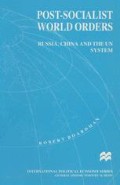Abstract
China’s ties to the diverse activities of the UN and its related agencies in economic, technical and security areas became far more intricate and complex in the 1980s. China brought on board officers of IFIs to help it plot a track of modernisation through the exacting terrain of ideological compromise, economic transformation and domestic political turbulence. As a permanent member of the UN Security Council, China had a crucial role to play in relation not only to continuing issues in Southern Africa and the Middle East, but also in the 1990s to mounting post-Cold-War ethnic and subnational conflicts. China would continue to support UN goals, Premier Li Peng said in May 1991, even though as a developing country it faced ‘arduous [tasks of] domestic construction’.
Access this chapter
Tax calculation will be finalised at checkout
Purchases are for personal use only
Preview
Unable to display preview. Download preview PDF.
Notes and References
Jin Dexiang, ‘The World in the 1990s: More Unrest, More Turmoil Ahead?’, Contemporary International Relations, no. 6, Feb. 1991, p. 9.
Marc Williams, Third World Cooperation: The Group of 77 in UNCTAD (London: Pinter, 1991), p. 71.
H. K. Jacobson and Michel Oksenberg, China’s Participation in the IMF, the World Bank, and GATT: Toward a Global Economic Order (University of Michigan Press, 1990), pp. 61–2.
Robert Boardman, ‘Guns or Mushrooms: Relations between the European Community and China, 1974–1980’, Politica. Tidsskrift for politisk videnskab, 13(1), 1981, pp. 50–79.
Feng Yushu, ‘When will China return to GATT?’, Liaowang (Hong Kong), 6–13 Feb. 1989; FBIS-PRC-89-029, 14 Feb. 1989, p. 1.
Qu Geping, ‘Work Report to the Third National Conference on Environmental Protection’, in Chinese Environmental Protection (Beijing, 1990), p. 90.
‘Beijing Ministerial Declaration on Environment and Development’, Environmental Policy and Law, 21/5/6 (1991), pp. 267–9; Beijing Review, 34(27), 8–14 July 1991, pp. 9–13.
See John Calabrese, ‘Peaceful or Dangerous Collaborators? China’s Relations with Gulf Countries’, Pacific Affairs, 65(4), 1993, pp. 471–85.
Ye Ruan, ‘Conception of World’s Future’, Shijie Zhishi, no. 13, 1 July 1991; FBIS-CHI-91-140, pp.2–3.
Author information
Authors and Affiliations
Copyright information
© 1994 Robert Boardman
About this chapter
Cite this chapter
Boardman, R. (1994). Understanding the Times: The UN System in a Complex World. In: Post-Socialist World Orders. International Political Economy Series. Palgrave Macmillan, London. https://doi.org/10.1007/978-1-349-14119-7_7
Download citation
DOI: https://doi.org/10.1007/978-1-349-14119-7_7
Publisher Name: Palgrave Macmillan, London
Print ISBN: 978-0-333-66475-9
Online ISBN: 978-1-349-14119-7
eBook Packages: Palgrave Political & Intern. Studies CollectionPolitical Science and International Studies (R0)

